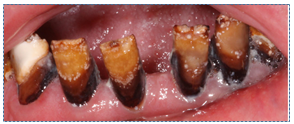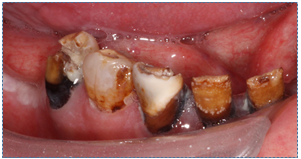- Reference Number: HEY-944/2021
- Departments: Oral Surgery, Dentistry and Max Fax, Radiotherapy
- Last Updated: 12 November 2021
Introduction
This leaflet has been produced to give you general information. Most of your questions should be answered by this leaflet. It is not intended to replace the discussion between you and the healthcare team, but may act as a starting point for discussion. If after reading it you have any concerns or require further explanation, please discuss this with a member of the healthcare team.
How does radiotherapy affect your teeth?
Dryness of the mouth and widespread dental decay:
Radiotherapy to the head and neck decreases the amount of saliva that you produce, which results in a dry mouth. Saliva is vital to protect your teeth against decay as it washes the sugar (carbohydrate) off your teeth and neutralises acids. Sugar and acid are the main cause of tooth decay.

OsteoRadioNecrosis (ORN):
Radiotherapy reduces the blood supply to your jaw bone and therefore the ability of the bone to heal. This means, if you need a tooth removing after radiotherapy, there is a chance that the bone associated with the tooth could die, causing a painful, long-standing condition called Osteoradionecrosis. This is also why some patients may require removal of badly broken down or infected teeth before radiotherapy to reduce the risk of ORN. Although this condition is treatable, it is easier to avoid it in the first place by looking after your teeth.

How to look after your teeth?
It is vital that you look after your teeth. Fluoride alone will not protect your teeth from decay unless you clean your teeth thoroughly well and limit the frequency of sugar in your diet.
- Water and milk are the preferred drinks.
- Avoid sugary drinks and food, especially in between meals including: Boiled sweets, Biscuits, tea and coffee with sugar, fruit juices, fizzy drinks (including sugar free).
- AVOID FIZZY DRINKS including FIZZY WATER as these contain carbonic acid.
- Avoid sucking boiled sweets to alleviate your dry mouth as this can cause widespread dental decay.
- If you have been prescribed Fortisips, DO rinse your mouth well with water after your drink to ensure that Fortisips does not coat your teeth for the rest of the day!
In addition to the above- brush your teeth without toothpaste after snacks too and then rinse well with water after flavoured drinks.
Why all the fluoride products?
Radiotherapy increases your risk of dental decay. Fluoride helps prevent decay by hardening the teeth. Harder teeth resist decay more effectively.
- Use the Duraphat fluoride toothpaste for life: Twice daily: morning and night. Spit out remaining toothpaste. Do not rinse with water. Do Not eat or drink for ONE hour.
- Use Fluorigard Mouthwash for life: Once daily at mid-day. Rinse vigorously and spit out. Do Not eat or drink for ONE hour after use.
- Custom Fluoride mouth trays: Use daily at a different time to other fluoride-containing products. Load tray with Duraphat toothpaste. Place tray in the mouth for 10 minutes. Spit out excess and do not rinse, eat or drink for ONE hour.
- Attend a general dentist for regular, 3 monthly check-ups for life.
Further advice
Should you require further advice on the issues contained in this leaflet, please do not hesitate to contact the Restorative Dentistry / Maxillo-facial department on telephone number (01482) 604444

